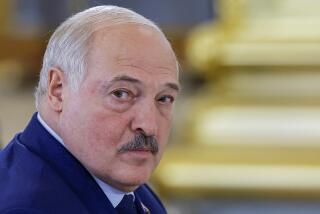Russia, Belarus Open Their Border : Accord: The two ex-Soviet states end customs checkpoints. But other former republics balk at alliances.
- Share via
MOSCOW — Russia and Belarus, two republics that instigated the breakup of the Soviet Union, abolished post-Soviet customs checkpoints along their common border Friday in a step toward rejoining pieces of the broken empire.
“The border between Russia and Belarus no longer exists,” Russian President Boris N. Yeltsin declared as he arrived in Minsk, the Belarussian capital, to lead a summit of the Commonwealth of Independent States.
But after holding up the border agreement as an example, Yeltsin fell short of other goals at the meeting to forge common economic and military policies among the 12 former Soviet republics that make up the commonwealth.
Their leaders differed sharply on three main points--a monetary alliance that would help sort out mutual debts, a human rights charter and Russian-led patrols of the former Soviet Union’s outer borders.
By the end of the one-day session, seven republics had joined the monetary alliance, six had signed the rights charter and seven had agreed to joint patrols. All three arrangements, weakened by the lack of unanimous support, were left open for others to join later.
Before the summit, Yeltsin had sketched his vision of the commonwealth as “something like the European Community, where countries have full independence but put all their problems in one bag.”
Summing up, he voiced disappointment with progress toward that goal. “If we are seriously talking about integration, it is impossible to postpone indefinitely the formation of a monetary alliance for mutual settlements,” he lectured fellow heads of state.
In December, 1991, Yeltsin joined Stanislav S. Shushkevich and Leonid M. Kravchuk, then the leaders of Belarus and Ukraine, in dooming the Soviet Union when they signed an agreement to seek their nations’ independence. Russia has since moved to dominate its 14 newly independent neighbors, using the loosely organized commonwealth to lobby for agreements, on Moscow’s terms, to slow or reverse the empire’s disintegration into separate economic and military entities.
Eleven of Russia’s neighbors, all but the three Baltic states, are members of the commonwealth. But many distrust Moscow and take part warily to safeguard their independence.
For example, Ukrainian President Leonid D. Kuchma, who wants to bring his nation into the North Atlantic Treaty Organization, opposed any Russian-led patrolling of Ukraine’s European borders. “There are no external commonwealth borders,” he said. “There are internal and external borders of each state.”
*
Azerbaijan, Turkmenistan, Uzbekistan and Moldova also refused to allow any but their own armies to patrol their outer borders.
But much of the drive for a stronger commonwealth comes from states such as Belarus that seek continued low prices for Russian oil, gas and other exports. Two weeks ago, voters there overwhelmingly endorsed moves by their new president, Alexander G. Lukashenko, toward closer economic ties with Russia.
“I’m distressed about disintegration of what once was a great state,” Lukashenko said Friday. “We must go along the path of strengthening integration. This is the main goal of politics today.”
In January, Belarus, Kazakhstan and Russia signed a free-trade pact; Friday’s abolishing of customs posts is the first step of its implementation. Uzbekistan and Kyrgyzstan have announced interest in joining the free-trade zone.
Another agreement at Friday’s summit will set up an automobile plant in Russia as a joint venture among Russia, Ukraine and General Motors.
The summit also extended the mandate of Russian-led commonwealth peacekeeping troops to oversee return of war refugees to Georgia’s breakaway Abkhazia region and to protect Tajikistan’s pro-Moscow government from Tajik guerrillas based in Afghanistan. But Tajikistan’s president came under pressure from Yeltsin and others to settle the civil war or lose the protection.
Yeltsin agreed to meet Kuchma on June 9 in Sochi, a Russian port on the Black Sea, to tackle the biggest dispute between Russia and Ukraine--division of naval bases of the former Soviet Black Sea Fleet. The dispute is holding up a full-scale summit between the two leaders, who favor closer economic ties between the most powerful former Soviet republics.
More to Read
Sign up for Essential California
The most important California stories and recommendations in your inbox every morning.
You may occasionally receive promotional content from the Los Angeles Times.













